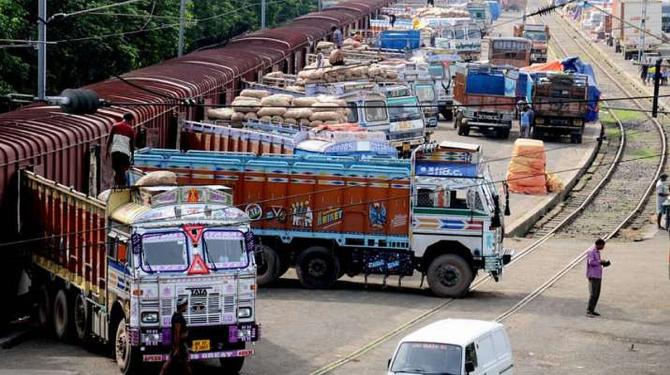Vehicle supply is already higher than needed, so when fleet owners prune sizes, single-owners who supply them their trucks will be hit hard.

About 50,000 truckers, most of whom are single-truck owners, could be thrown off their businesses due to the recent fuel price hike.
“Already the vehicle supply on the road is higher than the requirement.
"With the fuel price hike, fleet owners will look to cut down fleet size wherever needed and due to this, small single-truck owners could be at the receiving end,” Ashok Goyal, managing director at BLR Logistiks (I) Ltd told Business Standard.
The company has a fleet of 500 vehicles of all types—small, medium and large with pan-India presence.
Meanwhile, pan-India commercial vehicles on the road are about eight lakhs.
Single-truck owners usually act as suppliers to fleet owners who outsource their business to these small players for better network and deeper penetration in the region.
“Fuel cost is more than 50 percent of our total costs and so to that extent the cost push is high.
"Even though we are in contracts for the fuel supply, the formula applied is such that we are not able to pass on nearly 80 per cent of the hike to the customers.
"This leaves us with no margin. It is going to be tough going ahead,” explained Goyal.
However, some small fleet operators are also taking advantage of the hikes.
“Small transporters that follow the spot prices have been increasing prices in tandem with the changes in fuel prices,” said Sachin J K S Haritash, founder and chief executive officer at Mavyn, a truck aggregator that counts Hindustan Unilever, Amazon, Flipkart, among others as its key customers.
It has close to 8,000 trucks registered on its platform. Of these, 80 per cent have a fleet of less than 20 trucks.
“The quantum of increase taken by these operators is higher than the actual increase in the fuel prices,” said Haritash.
“If fuel prices have gone up by four per cent in a month, the rates of small transporters have gone up six per cent.
"They have been taking advantages of the fuel price hike and surge in demand,” he added.
With petrol and diesel prices continuously on a rise, with petrol prices hovering around Rs 100 per litre mark coupled with a 12 consecutive days of rise in fuel prices to their record highs, domestic freight costs have nowhere to go but northward.
Meanwhile, the temperature controlled truck transportation industry is preparing to pass on the entire fuel price hike to its customers.
“In temperature controlled industry, the demand is far higher than the supply and so the cost push is not expected to hurt the business.
"We are currently negotiating with our clients and mostly by March, new freight rate will be effective,” informed Rahul Agarwal, managing director at Kool-Ex Cold Chain Limited.
In FY21, fuel prices have gone up by about 30 percent till date, said industry experts.
Officials were also of the view that the government’s move to hike fuel prices is in contradiction to its goal of lowering logistics cost across country to single digit of the total cost of production.
"With an already high operational cost, fuel costs are adding to the woes of logistics and transport companies, eating up margins, contra-indicative to the government’s goals of bringing down logistic costs from 13-15 per cent to 8 per cent.
"If the fuel costs continue to remain elevated, a corresponding increase in product delivery costs will become imperative, eventually bringing about a domino effect, resulting in higher inflation," said Aditya Vazirani, chief executive officer of Robinsons Global Logistics Solutions (RGL).
RGL, a warehousing and distribution company than has been spun off from the parent Robinsons Cargo & Logistics (RCNL).
The company brings a strategic combination of technology, international best practices and deep domain expertise to the Indian market.
Meanwhile, S P Singh, senior official at New Delhi-based Indian Foundation of Transport Research and Training (IFTRT) informed that the rentals for the current month (February) have gone up 13-14 per cent as compared to what it was in January.
“Typically, prices tend to go up in the last quarter. Manufacturers across the sectors tend to push inventory before closing the books,” he added.
Singh maintained that the cost push witnessed in the market is a combination of fuel price hike coupled with pick up in cargo in core sectors, merchandise, packaged goods, and perishables.
Large fleet operators that work with big companies have monthly contracts.
"Logistics, in particular, is among the first and most affected sector so far (due to fuel price hike).
"There are already talks of transporters seeking a hike in freight costs by 10-15 percent, and small contractors and supply chain companies are already re-evaluating long term contracts, sighting volatility in fuel costs," informed Vazirani of RGL.
Companies are under pressures from these contractors to revise the freight rates, said industry experts.
“As of now we will be passing on the cost to the customers. Going ahead, with elections scheduled in several states, we need to wait and watch how things pan out,” said Chander Agarwal, managing director of TCI Express.
Photograph: PTI Photo












 © 2025
© 2025